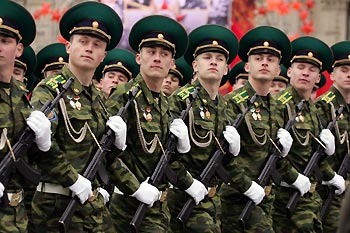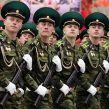
Russia’s “Spineless” Army: Paper Sergeants
Publication: Eurasia Daily Monitor Volume: 8 Issue: 76
By:

A critical test for the reform of the Russian armed forces is whether and to what extent a new generation of professional non-commissioned officers (NCOs) can be formed. Marshal Zhukov once stated, “I and the NCOs run the Army.” Yet, the NCO cadre has effectively ceased to exist in Russia, and the latest efforts to address this crucial issue have been encased in another experiment.
It appeared that the defense ministry was serious about reforming the NCO cadre, and despite early setbacks in 2009 a prestigious 34 month course was opened in Ryazan in December 2009 to train professional NCOs for the Ground Forces, Airborne Forces (Vozdushno Desantnye Voyska –VDV) and a variety of military specialties. Failure to secure enough cadets for the course, or address how to develop the Ryazan model to produce sufficient numbers of NCOs for the armed forces signaled deeper problems. On April 6, 2011, Krasnaya Zvezda reported on a visit by President Dmitry Medvedev and Defense Minister Anatoliy Serdyukov, to the VDV 45th Guards Spetsnaz Regiment in Kubinka, west of Moscow. An unmanned aerial vehicle (UAV) technician asked his commander-in-chief about the career structure for contract NCOs. Medvedev speculated that an NCO might progress to become an officer: Serdyukov was promptly told to examine it (Krasnaya Zvezda, April 6).
Much of the official reporting on the progress of the Ryazan NCO experiment has been positive, emphasizing pay and conditions, with cadets paid 21,000 rubles monthly ($746.57) –provided their grades are “excellent,” while others receive 16,000 rubles ($568.81). Consistent with plans to increase pay and allowances throughout the armed forces in 2012, professional NCOs will be paid up to 34,000 rubles monthly ($1,208.73). Krasnaya Zvezda stresses that two categories of cadet enter the professional NCO course in Ryazan: those who have completed conscript service and no older than 24, and contract personnel aged up to 30. The Commander-in-Chief of the Ground Forces, Colonel-General Alexander Postnikov remains broadly supportive of the course and its aims, though he has called for professional NCOs to be trained in ten month courses (Krasnaya Zvezda, February 26; Interfax, March 15).
Highlighting the crucial nature of the issue, Colonel (retired) Vitaly Shlykov sharply criticized current plans to form a new NCO cadre. In Voyenno Promyshlennyy Kuryer, Shlykov’s indictment of the defense ministry appeared in the second of a three-part series titled: “Beskhrebetnaya Armiya” (Spineless Army). Arguing that for more than fifty years the US systematically worked on developing the world’s finest NCO corps, while Russia meandered in the opposite direction, Shlykov dismissed the Ryazan experiment as a mere public relations exercise designed to assuage the ministry’s critics. Indeed, he drew attention to the insufficient numbers pursuing the elite course and said that Russia is unique in taking as long as 34 months to train proper sergeants (Voyenno Promyshlennyy Kuryer, https://vpk-news.ru/articles/7426, April 13).
Shlykov noted that the former Defense Minister, Colonel-General Igor Rodionov lamented in 2003 that Russia was the first country in modern military history attempting to exist without a body of junior commanders. All efforts to reduce institutional dedovshchina in the barracks ultimately flounder in the absence of high-quality NCOs. In an interview in Rossiyskaya Gazeta in 2006 the sociologist Sergei Belanovsky had warned against reducing the length of conscript service, arguing that it may result in the collapse of the Army. Shlykov had disagreed with this negative assessment, and like many others considered that reducing the term of service from two years to twelve months might reverse ill-discipline in the barracks. The experience of the “new look” has demonstrated Belanovsky’s thesis, and according to Shlykov the collapse of the army has most likely only been avoided as a result of the 8,000 officers demoted to fill sergeant posts, as well as some aspects of Serdyukov’s efforts to “humanize” military service. Shlykov believes the defense ministry is now wasting time trying to disprove Rodionov’s assertion that the Russian military is trying to survive without NCOs (Voyenno Promyshlennyy Kuryer, April 13).
The tendency of the defense leadership has been to pin the ultimate blame for the worst manifestations of dedovshchina on commanders. Referring to a case in which a commander roll-called his men in the freezing cold after they had bathed which resulted in the then Defense Minister, Sergei Ivanov, drawing the conclusion that commanders are often the culprits. Commanders, in turn should be responsible for stamping out this unwelcome aspect of military life, and Serdyukov has expressed similar views. Shlykov argues that this is like finding a purse under a lamp because there is light, overlooking the much deeper need for NCOs. Reducing the term of service, then cutting the number of officers in the armed forces without introducing high-quality NCOs was, in Shlykov’s view, irresponsible on the part of the defense ministry. He agreed with the former Head of the Main Directorate of the Ground Forces, Colonel-General Yuri Bukreev who told a meeting of reserve officers that the institution of sergeant exists in Russia only on paper (Voyenno Promyshlennyy Kuryer, February 23).
Consequently, the “new look” relies upon conscript NCOs whose training since December 1, 2010 has been “streamlined” from five months to three months. Indeed, since October 2010, the Ryazan Higher Airborne Command School has trained conscript sergeants in courses lasting three months. Following preparatory phases, the first conscripts completing this course were sent to units on March 28, 2011. They include conscript servicing, maintenance and repair of motor transport and communications specialists, platoon commanders and deputy commanders in combined-arms brigades, VDV subunit specialists and reconnaissance specialists for Spetsnaz. Condensing the length of the training period has resulted in cutting corners, specifically in technical and weapons training. There are reported shortages of simulators and other combat training equipment. The educational levels of many conscripts are frequently too low to meet the demands for specialists. Moreover, in implementing the “new look” training posts to train platoon and company commanders were eliminated, and only one course officer remained which proved to be insufficient. Company first sergeants, according to one source, are civilians paid only 5,000 rubles monthly ($177.75) and consequently many leave (Zapiski Russkogo Soldata, February 11).
Rudyard Kipling observed in the nineteenth century that “the backbone of the Army is the non-commissioned man,” and it was known and understood in Zhukov’s military. Shlykov has highlighted that the current reform is in effect in suspended animation, as the backbone of the Russian Army is missing.




